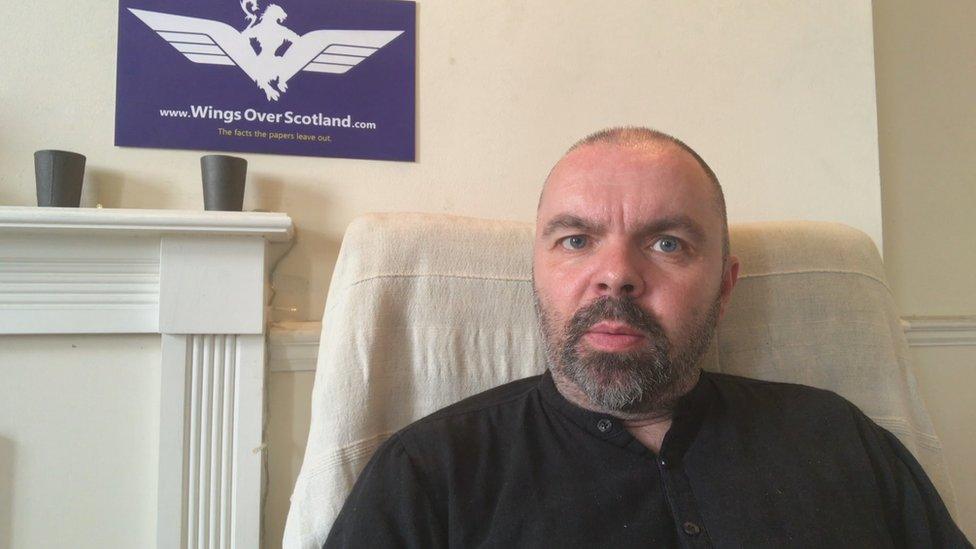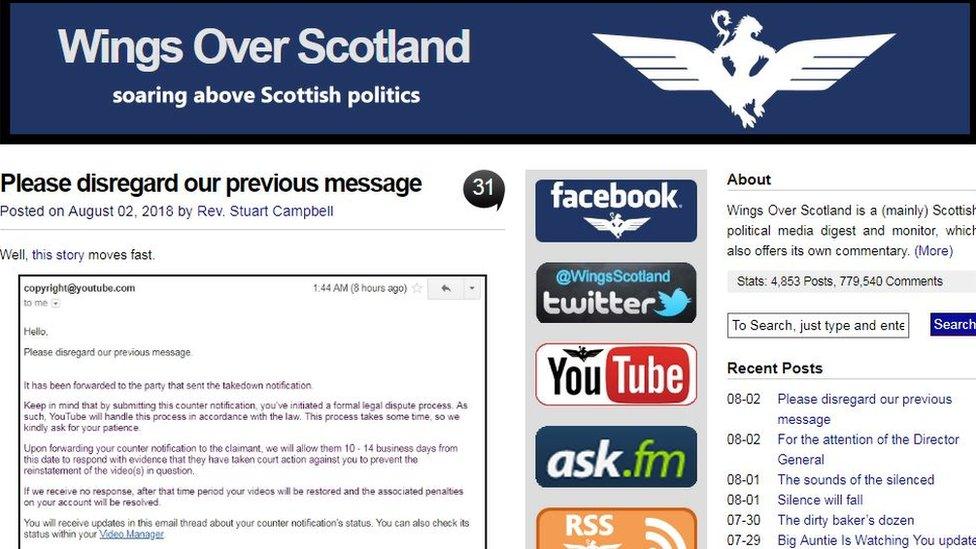Wings Over Scotland channel reopens
- Published

Mr Campbell welcomed the announcement that the BBC was to review how it deals with the use of its political content on social media
A YouTube channel run by the Scottish independence blog Wings Over Scotland has been allowed to reopen.
It was shut down at the weekend after the BBC claimed 13 videos that had been uploaded to the channel breached its copyright.
YouTube has now allowed the channel to return, but without the videos at the centre of the row.
However, the BBC said it had asked YouTube to also allow the 13 videos to be reinstated to the channel.
BBC Scotland's head of public policy, Ian Small, said the move came after discussions with "colleagues in London and elsewhere in the BBC".
The broadcaster will also carry out a review into how it deals with copyright claims over videos that have political content, particularly on social media.
Until the review has been completed, the BBC said it would not be seeking the removal of such content "unless it is used in a substantially misleading manner or we need to act to protect our commercial or brand interests."
Welcoming the announcement, Stuart Campbell - who runs Wings Over Scotland - told BBC Scotland that he was "very glad that the BBC has finally put this mad shambles to an end and that it is going to go away and look at this and try to come up with a sensible policy".
He added: "Obviously the BBC has got to protect its own intellectual commercial property, and other peoples, but under normal circumstances news reporting shouldn't ever be any part of that".
The BBC has been widely criticised by independence supporters over its decision to ask for the videos to be taken down, with former first minister Alex Salmond writing to the corporation's director general to express his concerns about the move.
YouTube operates a "three strikes" policy, which means anyone accused of at least three copyright infringements automatically has their channel removed.

Mr Campbell posted an email he received from YouTube on his blog
Speaking on Wednesday, Mr Campbell insisted the videos using BBC material that had been posted on his channel should not have been taken down as they were covered by "fair dealing" exemptions to copyright law.
The exemption allows material to be used for the purposes of "criticism, review and reporting current events".
However, fair dealing rules only allow a "reasonable and necessary" amount of someone else's work to be used - which is usually taken to mean short clips rather than lengthy chunks of programmes.
The channel of another prominent independence campaigner, Peter Curran, was also closed after the BBC highlighted copyrighted material on it.
Mr Campbell, who is Scotland's best known political blogger, said the takedown notice had been sent to YouTube by a "specialist intellectual lawyer at the BBC's legal department in London".
And he has claimed the BBC appeared to be targeting pro-independence channels while turning a blind eye to other political sites that used its material - an accusation strongly denied by the broadcaster, which says it has taken similar action against channels "across the political spectrum".
'No editorialising'
Responding on the John Beattie programme to the criticisms, Mr Small said the decision to ask for the videos to be removed had been taken by the BBC "entirely on legal and rights grounds - there was no editorialising at all in any of this".
He also said it was "impossible" for the BBC to check every website for copyrighted material, so it instead had to rely on other people alerting it to the videos.
And he insisted that the corporation "will look at any website irrespective of the political leanings" and that "if we were alerted to other websites where there is substantial amounts of BBC content then similar actions would be undertaken".
Mr Small added: "What happened was somebody alerted the BBC to the fact that there was a Labour councillor who had material on his website.
"The BBC issued a notification on that and he in turn indicated that we had not taken any action relative to Wings Over Scotland material.
"Because we had been alerted to that we had necessarily to take action."
The BBC later clarified that the councillor, Prof Scott Arthur, had referred to other channels, including Wings Over Scotland, as examples he had looked at when trying to establish whether his own use of BBC material could be considered "fair use".
A spokesman said: "Prof Arthur did not make a complaint or suggest particular action should be taken against these channels, but having been alerted to their use of our content we acted as per our policy (which is now being reviewed)."